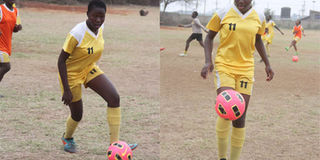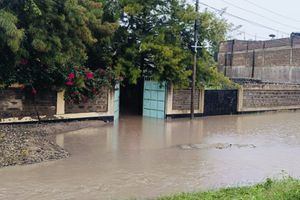Football has opened a door of endless opportunity

Veronicah Awino of Acakoro at Korogocho, is the youngest player in Kenya’s women’s football national team, Harambee Starlets. PHOTO| MARTIN MUKANGU
What you need to know:
- The sports sector has been identified as one of the significant drivers to achieving the Sustainable Development Goals (SDGs) including eradication of poverty, promote health, promote gender equality, achieve quality education, and promote sustainable human as well as human potential.
- The voices of young children playing football grows louder as we approach the pitch; there’s occasional laughter and a call for the ball. At one corner of the pitch is a group of girls in faded football gear, complete with boots that have seen better days.
- Like most children living in slums, to survive as best as she could in the harsh environment, Awino was forced to develop a tough exterior - she was tough-talking, rude and fast to throw a punch when the situation called for it.
- It appears that she might have underestimated herself because two weeks later, two people turned up at Boma Rescue Centre, first to ask, but later to demand that she be allowed to play football.
- It is her performance during one of the primary school national competitions in June last year, in Nyeri County, that Awino caught the eye of the national team scouts.
The odour of filth pervades the streets of Nairobi’s Korogocho slum, a 20-minute drive from Nairobi’s Central Business District. A little off the road, just before the Korogocho, Kariobangi South and Dandora slums intersection, is a narrow pathway that leads to Our Lady of Fatima Secondary School, one of the few high schools in the area.
It is early afternoon, and inside the school are children from the slum, many of them below 10 years, playing barefoot in the playground that has sparse grass cover.
The sports sector has been identified as one of the significant drivers to achieving the Sustainable Development Goals (SDGs).
Key among these goals are eradication of poverty, promote health, promote gender equality, achieve quality education, and promote sustainable human as well as human potential.
A MIRACLE
The voices of young children playing football grows louder as we approach the pitch; there’s occasional laughter and a call for the ball. At one corner of the pitch is a group of girls in faded football gear, complete with boots that have seen better days. Among this set of girls is 14-year-old Veronica Awino Arum, the youngest player in Kenya’s women’s football national team, Harambee Starlets.
Watching her skillfully run with the ball, it is hard to believe that just four years ago, Awino was a street child, a primary school dropout with nowhere to call home and absolutely no ambition. Life had dealt her and her family a heavy blow, and pushed her to leave home at just 10 years.
But then a miracle happened.
That day, Awino was seated alongside a dirty trench in Ngomongo area, within the Korogocho Slum, when a stranger approached her with a proposal that would change her life in so many pleasant ways.
“I ran away from home because my mother was unable to pay my school fees; house rent too, so we were constantly being locked out of the house - I felt I was a burden, and so one day I just left home,” Awino says, the memories of that difficult stage in her life bringing tears to her eyes.
'THE BADDEST'
Like most children living in slums, to survive as best as she could in the harsh environment, Awino was forced to develop a tough exterior - she was tough-talking, rude and fast to throw a punch when the situation called for it. She was what they call “the baddest” where she comes from.
Life on the streets, she remarks, was really no different from home, where she often slept hungry or out in the cold when the landlord locked them out. Awino will therefore always be grateful to that kind man who came to her rescue and took her to Boma Rescue Center, a home that provides temporary shelter for homeless children.
Here, she was asked to choose between drawing, singing or dancing. She chose dance, but she refused to go back to school and even threatened to go back to the streets if they forced her to. Life, she felt, was perfect just the way it was.
Her next miracle occurred in early 2014.
She heard about a certain football academy that was conducting trials for girls in the nearby Korogocho slums. She attended the trials alongside hundreds of other children. While most attended the trials with actual intentions of playing football, Awino was there for lack of anything better to do.
“I just went because I had free time; I knew little about football, just the basics,” she explains.
It appears that she might have underestimated herself because two weeks later, two people turned up at Boma Rescue Centre, first to ask, but later to demand that she be allowed to play football.
The two were Stefan Köglberger, a youth division coach and his wife Eldona, who run the Acakoro Football Academy.
“My supervisors at Boma Rescue Center were opposed to my playing football because plans were at an advanced stage to send me back to school. I remember Stefan telling my supervisor that if I wasn’t allowed to join Acakoro, then they wouldn’t take any players from the center again. That is how I ended up here.”
The rest, as they say, is history. Awino is not only playing football at national level, she is also back to school.
“I am in class seven at Damascus Primary School, and at 14 years, I am the oldest in my class, but this does not disturb me – I just concentrate on my studies; I want to be a doctor.”
HOW IT HAPPENED
It is her performance during one of the primary school national competitions in June last year, in Nyeri County, that Awino caught the eye of the national team scouts.
Unknown to Stefan and herself, she was drafted to the national under-20 women’s footall team, which was created as a fodder team for the senior women’s team, Harambee Starlets.
As Awino basks in the joy of playing for her country, she remains acutely aware of the plight that befell many of her former friends. She feels bogged down by the fact that most of them, still in their teens, are married with children or are single parents. Many, she says, to earn a living, are strippers at certain night clubs in the city’s CBD.
A study by the African Population and Health Research Centre (APHRC) in 2012, showed that in Nairobi’s urban slums, one in every five girls between 15 and 19 years is either pregnant or already a mother. In light of this, Awino’s story is definitely an incredible success story.
At Acakoro, besides the valuable training she receives, half her school fees is catered for too - her mother pays the rest.
Awino is currently training hard for the 2018 Women’s U-20 World Cup, which will be held in Paris, France.
She is thankful for the support she gets from her mother and elder brother, Bernard Arum, who, interestingly, plays for the men’s junior Harambee Stars national team.

Veronicah Awino, left and her brother Bernard Awino who plays in the men's Kenya National team, Harambee stars. PHOTO| MARTIN MUKANGU
“My mother supports me very much – sometime back, before I started taking football seriously, she was so angry when she learnt that I was skipping training, she asked for my brother’s intervention - he beat me up every day until I went back,” Awino says with a cheeky smile.
REHABILITATION
But what does it take to successfully rehabilitate children badly damaged by the effects of poverty? What are the chances that a street child can get back on track and make something of herself? What does it take?
“A lot of sacrifice. It takes lots of sacrifice and a very good strategy because in many cases, these children are beyond counselling,” says Jackline Juma, the Harambee Stars Starlet’s coach.
“It is especially very difficult to deal with the teenagers; many of them come here having endured the worst situations you could imagine. Some come here damaged completely, and sadly, those ones you cannot save.”

Acakoro ladies team and the Harambee Stars Starlet’s coach, Jackline Juma (left), with Veronicah Awino at Korogocho. PHOTO| MARTIN MUKANGU
Jackline adds,
“For instance, when Awino came here, she was hostile and contemptuous of authority. She would come to training when she felt like and would offer no apology.”
“Having grown up in the slum, I am familiar with what girls like Awino go through, so I know that if you force them to do things, you will only end up losing them. I let them talk back at me, vent, or act out, and when the steam cools off, I tell them the realities of life. I show them examples of young people who chose the wrong path and ended up destroying their lives, and then I let them make their own decisions,” she says.
Jackline, 30, is a former Harambee Stars Starlets player.
IN NUMBERS
10
Age when Awino left home for the streets due to poverty
7
She is a class seven pupil at Damascus Primary School in Korogocho
2014
Year when she joined Acakoro Footabll Academy and started playing football
CHANGING LIVES
Acakoro Football Academy is a non-profit organisation based at the Korogocho slums; it targets boys and girls living in surrounding areas.
Under the guidance of Stefan Köglberger, and with support from well-wishers in Austria where he comes from, Acakoro has been taking children here under their wing and teaching them how to play football for six years now. Besides this, they also offer their charges food and temporary shelter.
Awino’s call to play in the national team was the academy’s biggest score this year - she became the first female in the team to join a national team.
The academy was the brain child of an Austrian –based NGO, Hope for the Future, which has built three schools (two primary, one secondary) in the area.
Stefan and his wife Eldona are both Austrian football experts. Their aim is to nurture the children’s talent and give them a real chance in sports and academics through quality education and professional football training.
The academy partners with three schools in the area: namely, Damascus Primary School, Our Lady of Fatima Secondary School and Anointed Primary School. They pay half the school fees for all those in the academy and also provide playing kits and balls and for the very needy students. They also provide supper for their charges.
The academy currently comprises 108 children divided in the under 11, under 13, under 15 and under 17 men’s team – the girls form one team.
The academy’s under 11 team has, several times, been invited to participate in various international tournaments, and are the current holders of the Under-11 Donauauen Cup that was held in September 2016 in Austria. They beat Atletico Madrid under-11’s in the finals.




